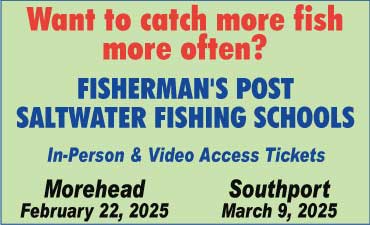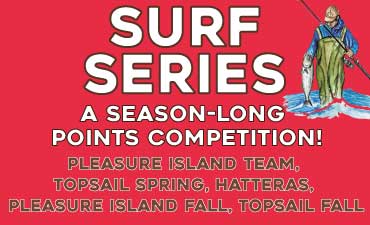Releases – September 24, 2015
Operation North State will host 300 Wounded Warriors, Disabled Veterans, and their respective guests to a great day of fellowship, fun, and fishing on Ocean Crest Pier at Oak Island, NC, on Friday, October 9th from 8:00 am – 4:00 pm.
Wounded Warriors and Disabled Veterans have signed up to fish from as far away as Brevard, Hickory, the Triad, Charlotte, Raleigh, etc. Spots are still available. The remaining openings will be offered to Wounded Warriors, Disabled Veterans, and now all Veterans.
The Festival represents “Grassroots North Carolina” at its finest: support is coming in from all over the state whereby it’s engaging numerous organizations, our youth, seniors, and other military support service organizations.
Operation North State is also in need of pier mates to assist these Special Americans.
To register as a participant or to offer your support for the 2nd Annual Peer Fishin’ Festival, call Operation North State at (336) 765-5967 or send an email to mailbox@operationnorthstate.com.
Commercial harvest of snowy grouper and vermilion snapper in South Atlantic waters closed at 12:01 a.m. (local time) on September 22, 2015.
The commercial sector of snowy grouper was closed on June 30, 2015, because the catch limit was met. On August 20, 2015, the final rule for Regulatory Amendment 20 to the Fishery Management Plan for the Snapper-Grouper Fishery of the South Atlantic Region increased the catch limit to 115,451 pounds gutted weight. Reports indicate the revised catch limit will be met by September 22, 2015. Commercial harvest will reopen at 12:01 a.m. (local time) on January 1, 2016.
The 2015 July-December commercial catch limit of vermilion snapper is 438,260 pounds whole weight. Reports indicate the catch limit will be met by September 22, 2015. Commercial harvest will reopen at 12:01 a.m. (local time) on January 1, 2016.
The operator of a vessel with a federal commercial permit for snapper-grouper that is landing snowy grouper or vermilion snapper for sale must have landed and bartered, traded, or sold such snowy grouper and vermilion snapper prior to 12:01 a.m. (local time), September 22, 2015. The prohibition on sale does not apply to sale or purchase of snowy grouper or vermilion snapper that were harvested, landed ashore, and sold prior to 12:01 a.m. (local time), September 22, 2015, and held in cold storage by a dealer or processor.
During the closure: (1) Harvest or possession of snowy grouper or vermilion snapper is limited to the recreational bag and possession limits; (2) Sale or purchase of snowy grouper or vermilion snapper is prohibited; (3) The prohibition on sale or purchase does not apply to the sale or purchase of snowy grouper or vermilion snapper that were harvested, landed ashore, and sold prior to 12:01 a.m., local time, September 22, 2015, and were held in cold storage by a dealer or processor; and (4) The closure applies in both state and federal waters for a vessel with a federal commercial permit for snapper-grouper.
These closures are necessary to protect the snapper-grouper fishery.
Two N.C. Marine Patrol officers will be honored as officers of the year by separate entities in the coming days.
Officer Jonathan Weaver will receive the South Atlantic Fishery Management Council’s Law Enforcement Officer of the Year Award on Sept. 17 during the full council meeting in Hilton Head, SC.
Officer Justin Lott will receive the Governor’s Conservation Achievement Awards Program’s 2015 Marine Fisheries Enforcement Officer of the Year award at the Annual Governor’s Awards Banquet on Sept. 12 in Cary.
Weaver began working with Marine Patrol in August 2008. He is stationed in Brunswick County and patrols the Oak Island and Holden Beach areas.
Among his colleagues, Weaver is known for developing cases on fisheries violations through careful inspection of fisherman-to-dealer sales records. Most notably, in February 2014, he discovered a bandit boat selling fish without the proper licenses.
This case resulted in the seizure of 1,022 pounds of snapper and grouper species, sold under court order for $3,428. Through further investigation, Weaver discovered five other unlawful sales of snapper and grouper species by the same fisherman totaling 4,906 pounds. The fisherman was charged and convicted of selling fish without a commercial fishing license. Additionally, the fisherman and the dealer were assessed and paid civil penalties, totaling $3,500.
Lott began working for Marine Patrol in September 2011. He is stationed in Dare County and patrols the beaches from Kitty Hawk to the Virginia state line, as well as Currituck Sound.
Lott regularly investigates and solves cases involving recreational and commercial fishing violations, such as illegal sales of seafood, over limit possession of marine species, harvest of undersized shellfish and possession of prohibited marine species. Often these cases involve all night boat patrols and lengthy investigation and research while working jointly with other fisheries law enforcement agencies.
While the total number of anglers who enjoy fishing remains fairly consistent year-in and year-out, the number of anglers who actually bought a license in ten consecutive years remains amazingly small–four percent of the approximate 33 million anglers in the United States to be exact. This was the startlingly discovery revealed by a recent study conducted for the American Sportfishing Association (ASA) by Southwick Associates.
“The fact that overall fishing participation numbers are quite stable from year to year could lead to the erroneous conclusion that anglers consistently renew their licenses,” stated Tom Allen, Vice President of Research at Southwick Associates. “This is the first in a series of reports to be released on the topic. Upcoming reports will show which types of anglers are at greatest risk of not coming back, how to keep them engaged and lifestyles of various angler segments.”
In the study, Southwick Associates, the nation’s leading researcher in outdoor economics and recreational market statistics, examined fishing license data over a 10-year period, from 2004 to 2013, from 12 states. Those states included Colorado, Florida, Georgia, Maine, Mississippi, Minnesota, Mississippi, Montana, New Hampshire, New York, Utah, and Wisconsin. The goal was to determine how many anglers transition in and out of the sport from year to year, a phenomenon also known as “churn”.
Key findings of the report, titled “U.S. Angler Population, Who Comes and Who Goes,” included:
(1) The largest portion of anglers, 49 percent, purchased a license only one out of 10 years.
(2) Only four percent bought a license in each of the ten years.
(3) In any given year, close to half of anglers do not renew their fishing licenses.
(4) The “typical” angler buys a fishing license just 2.9 out of every 10 years.
(5) When looking at 5-year periods, that number drops to most anglers buying a license just every 2.1 years out of 5.
(6) Those groups of anglers most likely to lapse each year include female anglers, urban residents and those people between the ages of 18 and 24.
(7) Forty-four to 48 percent of anglers each year represent a group that had not bought a fishing license the previous year.
So what does this high rate of churn mean for state and federal fishing agencies? Or even the fishing industry as a whole?
For most, it translates into lost dollars as people who would otherwise be considered prime candidates for participating in fishing step away from the sport. These lost dollars not only impact the companies that make boats, tackle, rods and other fishing gear, but also guide services, hotels and local communities that cater to anglers.
“Perhaps the biggest impacts are realized by state game and fish departments who directly lose revenue from lost license sales, along with the lost excise taxes collected in the sale of fishing gear and boat fuels,” says Rob Southwick, president of Southwick Associates. “These monies are used to support fisheries and habitat work, as well as build and maintain sportfishing infrastructure such as of public piers and boat ramps.”





